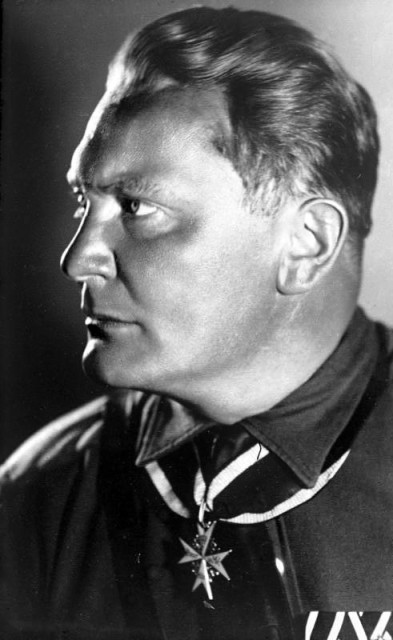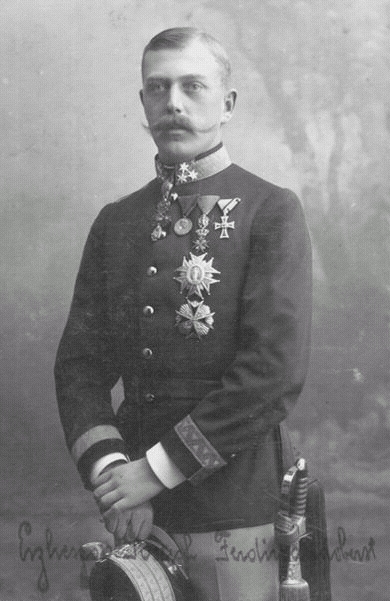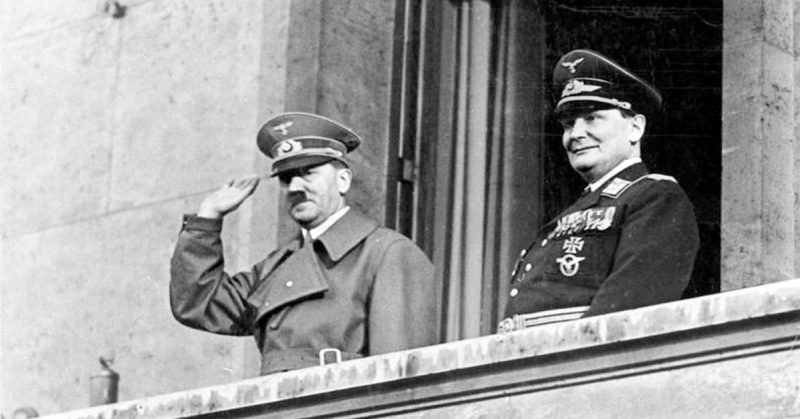Hermann Wilhelm Göring was one of Adolph Hitler’s earliest supporters and the second most powerful man in Nazi Germany. Founder of the Gestapo (the secret police) and head of the Luftwaffe (air force), he was directly responsible for many human rights abuses and war crimes.
His younger brother, on the other hand, was his exact opposite. Albert Günther Göring despised the Nazi regime. Using his wealth, connections, and relationship to Hermann, he saved Jews and dissidents at great risk to himself. Despite this, he was also punished after the war.
Born on 9 March 1895, Albert was the fifth and youngest child of Heinrich Ernst Göring and Franziska Tiefenbrunn… at least officially. Rumor has it that his biological father was actually his godfather, Ritter Hermann von Epenstein – a Jew who converted to Catholicism to become a noble.
If true, then Hermann and Albert were only half-brothers. It also means that Albert was half-Jewish – a crime in Nazi Germany. Whatever the case, the two were complete opposites. Hermann was fat, loud, arrogant, blunt, militaristic, and political. Albert was thin, quiet, melancholic, private, and apolitical.
As a child, Albert was a shy bookworm who preferred staying indoors, while Hermann craved company and the outdoors. Hermann went through many different schools because he was always getting kicked out for causing trouble. At his last one, he cut the strings of all the instruments in the school band, which got him sent to a military school.
In 1919, Albert studied mechanical engineering at the Technical University in Munich where he met future leaders of the Third Reich. Among these was Heinrich Himmler (head of the SS and architect of the concentration camps), who was then an agronomy student.

The brothers had their falling out in 1923 when Hermann joined Hitler’s first attempt to overthrow the German government. Hitler got arrested and Hermann got shot in the leg, requiring him to be smuggled to Innsbruck for surgery. To dull the pain, he was given morphine which he became addicted to.
To avoid any association with him, the Göring children broke off all contact, even when Hermann was later institutionalized in a hospital in Sweden. But the Nazi party did take root in Germany and Hitler rose to power. As things grew worse for minorities, Albert moved to Austria and became a citizen.
In 1938, however, Germany annexed Austria. Albert helped Jewish friends leave by using his influence with foreign embassies. Among these was Oskar Pilzer, the Jewish president of Sascha-Film and the Vienna Film Producers Association. Pilzer had already been arrested by the Gestapo, but Albert used his surname to get the man and his family out – first to Rome and then to Paris (where Pilzer died during an operation).
But the Nazis also arrested Archduke Joseph Ferdinand of Austria and sent him to Dachau. Hermann was delighted with his victory and feeling magnanimous, offered each of his four siblings a wish. That delight crumbled, however, when Albert and his sister, Olga, asked him to release the archduke. Hermann granted their wish, though the archduke’s health never recovered from his three-month stint in a concentration camp.
On the streets of Vienna, one day, Albert saw German soldiers humiliating an elderly Jewish woman. She was on her hands and knees scrubbing the cobblestone streets while wearing a sign that read, “I am a dirty Jew.” Furious, he helped the woman up and tore her sign off. When a soldier demanded to see his ID and saw the Göring name, he let the woman go.
Albert then moved to Czechoslovakia, and in 1939, became the export manager for Skoda (an automotive producer). In March of that year, however, Germany also invaded the country, putting many of Albert’s workers at risk. To help them leave, Albert forged his brother’s signature on exit documents.

He also sent trucks to concentration camps to ask for slave labor, only to release them in the woods. Albert allegedly encouraged minor acts of sabotage against the German occupiers and allegedly got in touch with the Czech resistance (though this has yet to be proven).
News of escaped Jews and dissidents from Skoda earned Albert four arrest warrants, but they were never carried out. Whether out of family ties or because he wanted to avoid being implicated in his brother’s crimes, Hermann protected Albert as best he could.
By 1942, however, Hermann’s star was waning. Germany’s war effort wasn’t going as well as it once had and the Luftwaffe was no longer the unstoppable force it had been. By 1944, a death warrant was issued for Albert. Hermann asked Himmler to smooth things over with the Gestapo and got Albert to Prague where he went into hiding.
The two would only see each other again in May 1945 at a transit jail in Augsburg – Hermann for what he had done and Albert for his surname. Hermann escaped the hangman’s noose by taking cyanide, but Albert stayed in prison for two years, even though he was an innocent man.
When he explained his anti-Nazi activities, the Allied interrogators accused him of lying. At the Nuremberg Tribunal (which had also tried his brother), he claimed to have saved hundreds of people, but could only write down the names and address of 34 people.
Given the chaos in the war’s aftermath, it was hard to verify these names until Alexandra Otsop came forward. She testified that Albert had rescued her husband and step-son by getting them deported instead of put in a concentration camp.
That got him released in 1947, so he moved to Czechoslovakia with his Czech wife. There, he was arrested again for his surname, but later released. He returned to Germany, but because of his surname, no one would hire him forcing him to survive on a modest pension until his death in great poverty in 1966.
Though some of his stories have been proven true, Yad Vashem (the World Center of Holocaust Research, Documentation, Education and Commemoration) refuses to give him the title of “Righteous Among Nations” – an award given to those who helped Jews during the Holocaust. They claim there’s no proof that Albert did anything heroic or that he was in any danger. Some insist, however, that it’s not because of a lack of proof, but because the Göring name is still too toxic.
